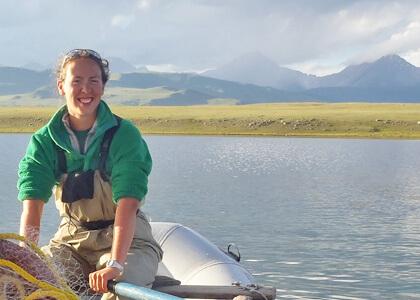Some students spend their summer relaxing at the beach. Some get a job working retail. Some travel to Mongolia to research endangered salmonids. This summer, I spent the month of July on a research expedition with the Mongolian-American Aquatic Ecology Research Initiative (MAAERI), traveling to Lake Hovsgol and the Eg-Uur Rivers as part of an ongoing research effort to investigate the impacts of climate change on several endangered fish species in the region. Led by Dr. Olaf Jensen from Rutgers University, our group of four undergraduate and graduate students joined six Mongolians to form our research team.
Our research focused on three main species: taimen (pictured below), lenok, and Hovsgol grayling. All three species are listed as either threatened or endangered on the Mongolian Red List. Advisors and students alike designed and implemented a variety of research projects to learn more about the ecology of these species, ranging from general population assessments to measurements of oxygen consumption to food web studies. My specific project seeks to determine the proportional contributions of aquatic versus terrestrial carbon sources in the diets of taimen, a fish whose diet is known to include a variety of organisms ranging from smaller fish to ducks and ground squirrels (It earned its name as the “River Wolf” for a reason!). Climate change may affect taimen along a variety of ecological pathways depending on their dominant food sources.
The expedition was a tremendous learning experience both scientifically and culturally. As students, we gained experience in a variety of standard fisheries biology techniques as well as in experimental design, skills we will undoubtedly use in our future careers. It was also an excellent opportunity to learn first hand the challenges of field-based research and learn to improvise when standard laboratory amenities were not available. Equally as valuable was the chance to travel to a new, exciting part of the world and experience a society and culture quite different from our own.
To any students in search of internships and adventures of their own, I do have a few words of advice. The best way to start is just to get your name out there. Look for a few professors whose research interests you and ask if they need any help around the lab; even if the answer is no, they will certainly be able to point you in the right direction. Once you start building some “lab cred” of your own, the rest will follow; you never know where a little experience and a good word from your advisor could take you!
